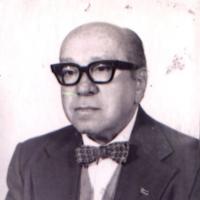Vía crucis de Harlem
Desandando la vida me regreso
a un ángulo de cruz de cuatro calles,
donde vine a sufrir ha un cuarto siglo
en pleno corazón del Bajo-Harlem…
La cosas que han pasado con los años
el mundo ya las sabe.
¡Oh, penas que ha sufrido el pueblo mío
llagado a flor de sangre!
Harapos por las calles y avenidas
espectros del acervo de Cervantes.
Isla mía en la América sajona,
raza mía ancestral. ¡Quijote errante
al azar del exótico camino!
¡Oteado amor de madre!
Por Harlem se encontraron
mis huérfanos congéneres viajantes;
arriaron la mochila
y optaron por quedarse…
La América española se desploma
con su humano detritus trashumante
por estas avenidas neoyorquinas
cruzadas por arterias transversales.
Con su barba de santo, Jesucristo
camina entre profanos y cobardes;
Su mirada la extiende a todo el mundo
y el mundo indiferente y miserable
Le ve pasar raído y sin abrigo
tubérculo y enjuto por el hambre.
Imagen del Mártir de Judea
desde el regazo de la Virgen madre,
hasta el puntal de tantas magdalenas
carimba el metamórfosis su carne.
Los fetiches de Harlem son los mismos
mercaderes de antaño que a la calle
arrojan a su prójimo y lo venden
por los treinta denarios tan indames;
y en el ora-pronobis de los pobres
la danza del dinero, la que a nadie
enternece de amor, sigue su curso;
su macabra función de tonos graves
sun piedad, majestuosa,
mortaja caravanas y hasta el aire
contamina de angustia
la exégesis impar de los mortales…
La historia se repite:
Es Gólgota este Harlem.
Aquí sentó cuarteles
con su santuario de antes,
el Cristo de Judea.
Mas el santo de mi tierra, el triste Cristo santo
del Cielo de Borinquen, acá y en todas partes,
mostrando su carimbo, con la mochila al hombro,
sin pan y sin abrigo, escuálido y sin sangre,
va cargando el madero tan sólo por ser paria
y, en esta tierra extraña, lo flagela el vejamen.
Se levanta y prosigue. Lo contempla su raza
sobre el ancho océano, sobre el gran Tiberiades
que de montes y llanos, al huir del calvario
lo llevó hacia Manhattan: ¡Al vía crucis de Harlem!
Arroyo, Angel M. "Vía crucis de Harlem". Láminas de mi infinito, Editorial Campos, San Juan, 1961, p. 21.
Derechos: Angel M. Arroyo; Editorial CamposHarlem Via Crucis (trans.)
Retracing my life I return
to a corner at a crossroads,
where I came to suffer twenty-five years ago
at the heart of Lower Harlem…
The things that passed through the years
the world already knows.
Oh, the pains my people have suffered
riped with bloody sores!
Rags through the streets and avenues
ghosts of Cervantes’ heritage.
My island at Anglo-Saxon America,
ancestral race of mine. Wandering Quixote
adrift on the exotic road!
A mother’s love ever watching!
In Harlem my fellow sibling
travelers found one another;
they took off their backpacks
and chose to stay…
Spanish America is tumbling down
with its migrant human detritus
through these New York avenues
crossed by transversal arteries.
With the beard of a saint, Jesus Christ
walks among the profane and the cowards;
His look spreads to the entire world
and the world indifferent and miserable
sees Him pass by threadbare and coatless
scrawny and barren by hunger.
The image of Judea’s Martyr
from the lap of his Virgin mother,
to the props of many magdalens
branding a metamorphosis on His flesh.
Harlem’s fetishes are the same
merchants of old who throw their neighbors
out on the streets and sell them
for thirty dinars, so infamous,
and during the ora pro nobis of the poor
the money dance, the one that heartwarms
no one’s love, stays its course;
its grisly function in grave tones,
pitiless, majestic,
shrouding processions and even polluting
the air with anguish
the odd exegesis of us mortals…
History repeats itself:
Golgotha is now this Harlem.
Here headquarters were established,
with its sanctuary of old,
by the Christ of Judea.
Yet my land’s saint, the sad, holy Christ
of the Borinquen Heaven, here and everywhere,
showing His branded scar, carrying His backpack,
foodless and coatless, squalid and bloodless,
is carrying his wooden cross just for being a pariah,
and on this strange land, He is lashed by ridicule.
He rises and continues. His own race watches
over the vast ocean, over the great Tiberias
that, through mountains and plains, fleeing from Calvary
took Him to Manhattan—To Harlem’s Via Crucis!
Arroyo, Angel M. "Vía crucis de Harlem". Láminas de mi infinito, Editorial Campos, San Juan, 1961, p. 21.
Derechos: Angel M. Arroyo; Editorial Campos
